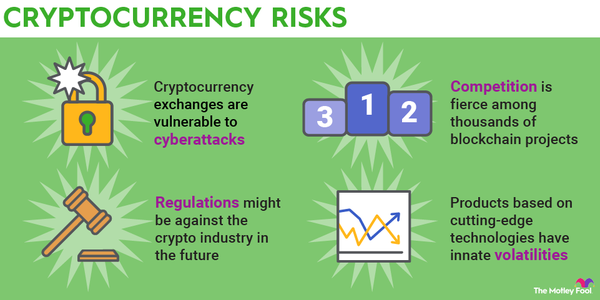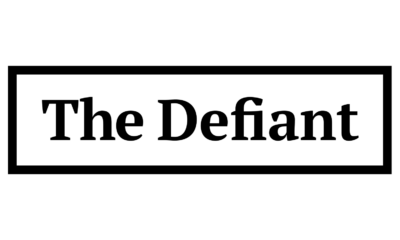News
Is Crypto a Good Investment in 2024?

It is possible to get filthy rich by investing in cryptocurrency — but it is also very possible that you lose all of your money. Investing in crypto assets is risky, but can be a good investment if you do it properly and as part of a diversified portfolio.
Is Cryptocurrency a good investment?
Is Cryptocurrency a good investment?
Cryptocurrency is a good investment if you want to gain direct exposure to the demand for digital currency. A safer but potentially less lucrative alternative is buying the stocks of companies with exposure to cryptocurrency.
Image source: The Motley Fool
Let’s examine the pros and cons of investing in cryptocurrency.
Is cryptocurrency safe?
Is cryptocurrency safe?
Multiple factors show that cryptocurrency is not always a safe investment. All the while, other signs are emerging that cryptocurrency is here to stay.
Cryptocurrency
Cryptocurrency is decentralized and secure digital money, based on blockchain technology, that offers new investment opportunities.
Risks of investing in Cryptocurrency
Risks of investing in Cryptocurrency
Cryptocurrency exchanges, more so than stock exchanges, are vulnerable to being hacked and becoming targets of other criminal activity. Security breaches have led to sizable losses for investors who have had their digital currencies stolen, spurring many exchanges and third-party insurers to begin offering protection against hacks.
Safely storing cryptocurrencies is also more difficult than owning stocks or bonds. Cryptocurrency exchanges such as Coinbase (COIN 10.53%) make it fairly easy to buy and sell crypto assets such as Bitcoin (BTC 0.53%) and Ethereum (ETH 0.34%), but many people don’t like to keep their digital assets on exchanges due to the risks of allowing any company to control access to their assets.
Storing cryptocurrency on a centralized exchange means you don’t have full control over your assets. An exchange could freeze your assets based on a government request, or the exchange could go bankrupt and you’d have no recourse to recover your money.
Some cryptocurrency owners prefer offline “cold storage” options such as hardware wallets, but cold storage comes with its own set of challenges. The biggest is the risk of losing your private key; without a key, it’s impossible to access your cryptocurrency.
There’s also no guarantee that a crypto project you invest in will succeed. Competition is fierce among thousands of blockchain projects, and many projects are no more than scams. Only a small percentage of cryptocurrency projects will ultimately flourish.
Regulators may also crack down on the entire crypto industry, especially if governments view cryptocurrencies as a threat rather than an innovative technology.
The cutting-edge technology elements of cryptocurrency also increase the risks for investors. Much of the tech is still being developed and is not yet extensively proven in real-world scenarios.
Cryptocurrency adoption
Cryptocurrency adoption
Despite the risks, cryptocurrencies and the blockchain industry are growing stronger. Much-needed financial infrastructure is being built, and investors are increasingly able to access institutional-grade custody services. Professional and individual investors are gradually receiving the tools they need to manage and safeguard their crypto assets.
Crypto futures markets are being established, and many companies are gaining direct exposure to the cryptocurrency sector. Financial giants such as Block (SQ 0.15%) and PayPal (PYPL -1.12%) are making it easier to buy and sell cryptocurrency on their popular platforms. Other companies, including Block, have poured hundreds of millions of dollars into Bitcoin and other digital assets. Tesla (TSLA -4.02%) purchased $1.5 billion worth of Bitcoin in early 2021. By February 2022, the electric vehicle maker reported that it held almost $2 billion of the cryptocurrency. MicroStrategy (MSTR 14.36%) — a business intelligence software company — has been accumulating Bitcoin since 2020. It held $5.7 billion in the cryptocurrency by the end of 2021 and said it plans to buy more with excess cash generated from operations.
Although other factors still affect the riskiness of cryptocurrency, the increasing pace of adoption is a sign of a maturing industry. Individual investors and companies are seeking to gain direct exposure to cryptocurrency, considering it safe enough for investing large sums of money.
Is crypto a good long-term investment?
Is crypto a good long-term investment?
Many cryptocurrencies such as Bitcoin and Ethereum are launched with lofty objectives, which may be achieved over long time horizons. While the success of any cryptocurrency project is not assured, early investors in a crypto project that reaches its goals can be richly rewarded over the long term.
For any cryptocurrency project, however, achieving widespread adoption is necessary to be considered a long-term success.
Bitcoin as a long-term investment
Bitcoin as a long-term investment
Bitcoin, as the most widely known cryptocurrency, benefits from the network effect — more people want to own Bitcoin because Bitcoin is owned by the most people. Bitcoin is currently viewed by many investors as “digital gold,” but it could also be used as a digital form of cash.
Bitcoin investors believe the cryptocurrency will gain value over the long term because the supply is fixed, unlike the supplies of fiat currencies such as the U.S. dollar or the Japanese yen. The supply of Bitcoin is capped at fewer than 21 million coins, while most currencies can be printed at the will of central bankers. Many investors expect Bitcoin to gain value as fiat currencies depreciate.
Those who are bullish about Bitcoin being extensively used as digital cash believe it has the potential to become the first truly global currency.
Ethereum as a long-term investment
Ethereum as a long-term investment
Ether is the native coin of the Ethereum platform and can be purchased by investors wishing to gain portfolio exposure to Ethereum. While Bitcoin can be viewed as digital gold, Ethereum is building a global computing platform that supports many other cryptocurrencies and a massive ecosystem of decentralized applications (“dApps”).
The large number of cryptocurrencies built on the Ethereum platform, plus the open-source nature of dApps, creates opportunities for Ethereum to also benefit from the network effect and to create sustainable, long-term value. The Ethereum platform enables the use of “smart contracts,” which execute automatically based on terms written directly into the contract code.
The Ethereum network collects Ether from users in exchange for executing smart contracts. Smart contract technology has significant potential to disrupt massive industries such as real estate and banking and also to create entirely new markets.
As the Ethereum platform becomes increasingly used worldwide, the Ether token increases in utility and value. Investors bullish on the long-term potential of the Ethereum platform can profit directly by owning Ether.
That’s not to say Ethereum doesn’t have competition. A number of “Ethereum Killers,” including Solana (SOL 0.38%), Polygon (MATIC 1.81%), and Avalanche (AVAX 1.96%), are all built to handle smart contracts and use a blockchain system capable of processing more transactions per second. The speed has the added advantage of being less expensive for users as well. But Ethereum is the most broadly adopted platform for using smart contracts.
Related crypto topics
Should you invest in cryptocurrency?
Should you invest in cryptocurrency?
Owning some cryptocurrency can increase your portfolio’s diversification since cryptocurrencies such as Bitcoin have historically shown few price correlations with the U.S. stock market. If you believe that cryptocurrency usage will become increasingly widespread over time, then it probably makes sense for you to buy some crypto directly as part of a diversified portfolio. For every cryptocurrency that you invest in, be sure to have an investment thesis as to why that currency will stand the test of time. If you do your research and learn as much as possible about how to invest in cryptocurrency, you should be able to manage the investment risk as part of your overall portfolio.
If buying cryptocurrency seems too risky, you can consider other ways to potentially profit from the rise of cryptocurrencies. You can buy the stocks of companies such as Coinbase, Block, and PayPal, or you can invest in an exchange like CME Group (CME -0.38%), which facilitates crypto futures trading.
Expert Q&A

Dr. Christine Parlour
PROFESSOR AND SYLVAN C. COLEMAN CHAIR OF FINANCE AND ACCOUNTING AT THE HAAS SCHOOL OF BUSINESS, UNIVERSITY OF CALIFORNIA, BERKELEY.
angle-down
angle-up
The Motley Fool: What advice would you give to someone interested in investing in blockchain technology?
Parlour: Be curious but also be cautious. It is important to recognize that there is not a complete regulatory framework in this area. So, it is important to do your homework. First, consider the venue that you use to access the market. There are regulated crypto exchanges and trading places; however, there are also unregulated ones. Second, while most tokens are based on open-source code, it is not the case that they have the same disclosure regimes as blue chip stocks. So, be careful and investigate the nature of the underlying token. Note that in other countries (Canada, Europe), there are ETFs and ETPs that track crypto portfolios; these have not received regulatory approval yet in the U.S. If and when they are offered to consumers, these will be a low-cost way of accessing the crypto market, and then someone else will handle the market mechanics.

Dr. Merav Ozair
FINTECH FACULTY MEMBER, RUTGERS BUSINESS SCHOOL
angle-down
angle-up
The Motley Fool: What advice would you give to someone interested in investing in blockchain technology?
Dr. Ozair: Blockchain technology is definitely the future. There is no escaping that. However, it is difficult to predict which projects will last and which will fail and be forgotten.
Most blockchain technology companies are in their early, if not very early, stages. Hence, investing in companies utilizing blockchain technologies has all the same risks as investing in a start-up. And like in any start-up, the risk-reward ratio is high.
Therefore, learn about blockchain technology, do a thorough due diligence on any project — from its technology to business model to execution. Learn about the “problem” it is trying to solve and what solution it’s offering — both from a technological perspective and a business perspective.
There’s a lot of potential with blockchain technology, but the execution is in the details.
The Motley Fool: Which industries, other than finance, do you think blockchain has the potential to disrupt?
Dr. Ozair: The future that I have been envisioning is that every product or service application we know today will run on some form of blockchain technology. In other words, the “rails” of all products and services (i.e., the technology that “runs” these applications) will be a type of DLT.
I truly believe that in 10 to 15 years, this would be feasible.
Like the internet, which has become a pivotal part of our everyday lives, and we cannot imagine life without it, so will DLT. When we use the internet, we do not ask ourselves – “How does it work?” or “Why should we use it?” – we simply use it for the mobility, flexibility, efficiency and connectivity it provides. The COVID-19 pandemic has underscored the Internet’s benefits. It enabled us to connect to services, products and people and facilitated a smooth transition to a remote, contactless global economy. Now Web 2.0 – Internet is evolving to Web 3.0 – Distributed Ledger Technology.
The Motley Fool: What innovations or trends in blockchain technology are you most excited about?
Dr. Ozair: The ecosystem of blockchain technology is evolving very rapidly. Every day (literally) you learn about new applications and new business use cases that have utilized blockchain technology. It is truly – slowly but surely – being implemented in any industry and any “traditional” application. From finance to healthcare to retail to art to education, the implementations are boundless.
The true power of blockchain technology is its ability to facilitate services to underserved communities and genuinely to democratize society. That was the premise of Bitcoin, when it was first launched in January of 2009 – i.e., a peer-to-peer payment system, and we somewhat lost focus on the main purpose of blockchain technology as” greed” got in the way.
The utilization of Decentralized Autonomous Organization (DAO) as the governance of any blockchain system and application, will enable blockchain applications to provide the needs of the underserved communities, nationally and globally.

Dr. Jimmie Lenz
Director, Master of Engineering in FinTech, Duke University
angle-down
angle-up
The Motley Fool: What advice would you give to someone interested in investing in blockchain technology?
Lenz: Learn and keep learning. The developments in the space are happening at a rapid pace, so much so that new knowledge is being generated constantly. As a professor teaching blockchain, this is the hardest part, reinventing the course every semester, but it keeps my students and me as current as possible. This doesn’t mean neglecting base knowledge; having this is crucial, as well as some sense of the history to understand why developments have occurred at specific times.
Anders Bylund has positions in Bitcoin, Coinbase Global, Ethereum, and Solana. The Motley Fool has positions in and recommends Avalanche, Bitcoin, Block, Coinbase Global, Ethereum, PayPal, Polygon, Solana, and Tesla. The Motley Fool recommends CME Group and recommends the following options: short December 2023 $67.50 puts on PayPal. The Motley Fool has a disclosure policy.
News
Bitcoin soars above $63,000 as money flows into new US investment products

Bitcoin has surpassed the $63,000 mark for the first time since November 2021. (Chesnot via Getty Images)
Bitcoin has broken above the $63,000 (£49,745) mark for the first time since November 2021, when the digital asset hit its all-time high of over $68,000.
Over the past 24 hours, the value of the largest digital asset by market capitalization has increased by more than 8% to trade at $63,108, at the time of writing.
Learn more: Live Cryptocurrency Prices
The price appreciation was fueled by record inflows into several U.S.-based bitcoin cash exchange-traded funds (ETFs), which were approved in January this year.
A Bitcoin spot ETF is a financial product that investors believe will pave the way for an influx of traditional capital into the cryptocurrency market. Currently, indications are favorable, with fund managers such as BlackRock (BLK) and Franklin Templeton (BEN), after allocating a record $673 million into spot Bitcoin ETFs on Wednesday.
Learn more: Bitcoin’s Success With SEC Fuels Expectations for an Ether Spot ETF
The record allocation surpassed the funds’ first day of launch, when inflows totaled $655 million. BlackRock’s iShares Bitcoin Trust ETF (I BITE) alone attracted a record $612 million yesterday.
Bitcoin Price Prediction
Earlier this week, veteran investor Peter Brandt said that bitcoin could peak at $200,000 by September 2025. “With the push above the upper boundary of the 15-month channel, the target for the current market bull cycle, which is expected to end in August/September 2025, is raised from $120,000 to $200,000,” Brandt said. published on X.
The influx of capital from the traditional financial sphere into Bitcoin spot ETFs is acting as a major price catalyst for the digital asset, but it is not the only one. The consensus among analysts is that the upcoming “bitcoin halving” could continue to drive flows into the bitcoin market.
The Bitcoin halving is an event that occurs roughly every four years and is expected to happen again next April. The halving will reduce the bitcoin reward that miners receive for validating blocks on the blockchain from 6.25 BTC to 3.125 BTC. This could lead to a supply crunch for the digital asset, which could lead to price appreciation.
The story continues
Watch: Bitcoin ETFs set to attract funds from US pension plans, says Standard Chartered analyst | Future Focus
Download the Yahoo Finance app, available for Apple And Android.
News
FRA Strengthens Cryptocurrency Practice with New Director Thomas Hyun

Forensic Risk Alliance (FRA), an independent consultancy specializing in regulatory investigations, compliance and litigation, has welcomed U.S.-based cryptocurrency specialist Thomas Hyun as a director of the firm’s global cryptocurrency investigations and compliance practice. Hyun brings to the firm years of experience building and leading anti-money laundering (AML) compliance programs, including emerging payment technologies in the blockchain and digital asset ecosystem.
Hyun has nearly 15 years of experience as a compliance officer. Prior to joining FRA, he served as Director of AML and Blockchain Strategy at PayPal for four years. He established PayPal’s financial crime policy and control framework for its cryptocurrency-related products, including PayPal’s first consumer-facing cryptocurrency offering on PayPal and Venmo, as well as PayPal’s branded stablecoin.
At PayPal, Hyun oversaw the second-line AML program for the cryptocurrency business. His responsibilities included drafting financial crime policies supporting the cryptocurrency business, establishing governance and escalation processes for high-risk partners, providing credible challenge and oversight of front-line program areas, and reporting to the Board and associated authorized committees on program performance.
Prior to joining PayPal, Hyun served as Chief Compliance Officer and Bank Secrecy Officer (BSA) at Paxos, a global blockchain infrastructure company. At Paxos, he was responsible for implementing the compliance program, including anti-money laundering and sanctions, around the company’s digital asset exchange and its asset-backed tokens and stablecoins. He also supported the company’s regulatory engagement efforts, securing regulatory approvals, supporting regulatory reviews, and ensuring compliance with relevant digital asset requirements and guidelines.
Thomas brings additional experience in payments and financial crime compliance (FCC), having previously served as Vice President of Compliance at Mastercard, where he was responsible for compliance for its consumer products portfolio. He also spent more than seven years in EY’s forensics practice, working on various FCC investigations for U.S. and foreign financial institutions.
Hyun is a Certified Anti-Money Laundering Specialist (CAMS) and a Certified Fraud Examiner (CFE). He is a graduate of New York University’s Stern School of Business, where he earned a bachelor’s degree in finance and accounting. Additionally, he serves on the board of directors for the Central Ohio Association of Certified Anti-Money Laundering Specialists (ACAMS) chapter.
Commenting on his appointment, Hyun said, “With my experience overseeing and implementing effective compliance programs at various levels of maturity and growth, whether in a startup environment or large enterprises, I am excited to help our clients overcome similar obstacles and challenges to improve their financial crime compliance programs. I am excited to join FRA and leverage my experience to help clients navigate the complexities of AML compliance and financial crime prevention in this dynamic space.”
FRA Partner, Roy Pollittadded: “As the FRA’s sponsor partner for our growing Cryptocurrency Investigations and Compliance practice, I am thrilled to have Thomas join our ever-expanding team. The rapid evolution of blockchain and digital asset technologies presents both exciting opportunities and significant compliance challenges. Hiring Thomas in a leadership role underscores our commitment to staying at the forefront of the industry by enhancing our expertise in anti-money laundering and blockchain strategy.”
“Thomas’ extensive background in financial crime compliance and proven track record of building risk-based FCC programs in the blockchain and digital asset space will be invaluable as we continue to provide our clients with the highest level of service and innovative solutions.”
“FRA strengthens cryptocurrency practice with new director Thomas Hyun” was originally created and published by International Accounting Bulletina brand owned by GlobalData.
The information on this website has been included in good faith for general information purposes only. It is not intended to amount to advice on which you should rely, and we make no representations, warranties or assurances, express or implied, as to its accuracy or completeness. You must obtain professional or specialist advice before taking, or refraining from, any action on the basis of the content on our website.
News
Bitcoin trades around $57,000, crypto market drops 6% ahead of Fed decision

-
Bitcoin fell in line with the broader cryptocurrency market, with ether and other altcoins also falling.
-
Financial markets were weighed down by risk-off sentiment ahead of the Fed’s interest rate decision and press conference later in the day.
-
10x Research said it is targeting a price target of $52,000 to $55,000, anticipating further selling pressure.
Bitcoin {{BTC}} was trading around $57,700 during European morning trading on Wednesday after falling to its lowest level since late February, as the world’s largest cryptocurrency recorded its worst month since November 2022.
BTC has fallen about 6.3% over the past 24 hours, after breaking below the $60,000 support level late Tuesday, according to data from CoinDesk. The broader crypto market, as measured by the CoinDesk 20 Index (CD20), lost nearly 9% before recovering part of its decline.
Cryptocurrencies have been hurt by risk-off sentiment in broader financial markets amid stagflation in the United States, following indications of slowing growth and persistent inflation that have dampened hopes of an interest rate cut by the Federal Reserve. The Federal Open Market Committee is due to deliver its latest rate decision later in the day.
Ether {{ETH}} fell about 5%, dropping below $3,000, while dogecoin {{DOGE}} led the decline among other major altcoins with a 9% drop. Solana {{SOL}} and Avalanche {{AVAX}} both lost about 6%.
Bitcoin plunged in April, posting its first monthly loss since August. The 16% drop is the worst since November 2022, when cryptocurrency exchange FTX imploded, but some analysts are warning of further declines in the immediate future.
10x Research, a digital asset research firm, said it sees selling pressure toward the $52,000 level due to outflows from U.S. cash exchange-traded funds, which have totaled $540 million since the Bitcoin halving on April 20. It estimates that the average entry price for U.S. Bitcoin ETF holders is $57,300, so this could prove to be a key support level.
The closer the bitcoin spot price is to this average entry price, the greater the likelihood of a new ETF unwind, 10x CEO Markus Thielen wrote Wednesday.
“There may have been a lot of ‘TradeFi’ tourists in crypto – pushing longs all the way to the halving – that period is now over,” he wrote. “We expect more unwinding as the average Bitcoin ETF buyer will be underwater when Bitcoin trades below $57,300. This will likely push prices down to our target levels and cause a -25% to -29% correction from the $73,000 high – hence our $52,000/$55,000 price target over the past three weeks.”
The story continues
UPDATE (May 1, 8:56 UTC): Price updates throughout the process.
UPDATE (May 1, 9:57 UTC): Price updates throughout the process.
UPDATE (May 1, 11:05 UTC): Adds analysis from 10x.
News
The Cryptocurrency Industry Is Getting Back on Its Feet, for Better or Worse

Hello from Austin, where thousands of crypto enthusiasts braved storms and scorching heat to attend Consensus. The industry’s largest and longest-running conference, which can sometimes feel like a religious revival, offers opportunities to chat and listen to leading names in crypto. And for the casual observer, Consensus offers a useful glimpse into the mood of an industry prone to wild swings in fortune.
Unsurprisingly, the mood is noticeably more positive than it was a year ago, when crowds were sparse and many attendees were quietly confiding that they were considering switching to AI. In practice, that means some of the more obnoxious elements are back, but not to the level of Consensus 2018 in New York, when charlatans parked Lamborghinis outside the event and the hallways were lined with booth girls and scammers pitching “ICOs in a box.”
This time around, Elon Musk’s Cybertrucks have replaced Lamborghinis as the vehicle of choice for marketers. One of the most notable publicity stunts was a startup that paid a poor guy to parade around in the Texas sun in a Jamie Dimon costume, wig, and mask, and then staged a mock assault on him by memecoin characters.
Outside the event was a giant “RFK for President” truck, while campaign staffers manned a booth instead — a reflection of both the election year and crypto’s willingness to latch onto any candidate, no matter how outlandish, who will talk about the industry. RFK himself is scheduled to address the conference on Thursday.
Excesses aside, the general sense of optimism was understandable. The cryptocurrency market has not only recovered from the wave of fraud that nearly sank it in 2022, it is riding a new wave of political legitimacy. This month, cryptocurrencies scored once-unthinkable political victories in Washington, D.C., and there is a sense that the industry has not only withstood the relentless regulatory assaults of SEC Chairman Gary Gensler and Sen. Elizabeth Warren, but is poised to defeat them.
And while cryptocurrency is still searching for its flagship application, the optimists I spoke with pointed to signs that it is (once again) upon us. Those signs include the rapid advancement of zero-knowledge proofs as well as the popularity of Coinbase’s Base blockchain and, perhaps most importantly, the large-scale arrival of traditional finance into the world of cryptocurrencies – a development that not only provides a major financial boost, but also a new element of stability and maturity that will, perhaps, tame the worst of crypto’s wilder side. Finally, this consensus marked the end of the Austin era as the conference, under new leadership, will be held in Toronto and Hong Kong in 2025.
The story continues
Jeff John Roberts
jeff.roberts@fortune.com
@jeffjohnroberts
This story was originally featured on Fortune.com
-

 News1 year ago
News1 year agoBitcoin soars above $63,000 as money flows into new US investment products
-

 DeFi1 year ago
DeFi1 year agoEthena downplays danger of letting traders use USDe to back risky bets – DL News
-

 News1 year ago
News1 year agoFRA Strengthens Cryptocurrency Practice with New Director Thomas Hyun
-

 DeFi1 year ago
DeFi1 year agoZodialtd.com to revolutionize derivatives trading with WEB3 technology
-

 Markets1 year ago
Markets1 year agoBitcoin Fails to Recover from Dovish FOMC Meeting: Why?
-

 DeFi1 year ago
DeFi1 year ago👀 Lido prepares its response to the recovery boom
-

 Markets1 year ago
Markets1 year agoWhale Investments in Bitcoin Reached $100 Billion in 2024, Fueling Crazy Investor Optimism ⋆ ZyCrypto
-

 Markets1 year ago
Markets1 year agoWhy Bitcoin’s price of $100,000 could be closer than ever ⋆ ZyCrypto
-

 DeFi1 year ago
DeFi1 year agoPancakeSwap integrates Zyfi for transparent, gas-free DeFi
-

 Markets1 year ago
Markets1 year agoWhales are targeting these altcoins to make major gains during the bull market 🐋💸
-

 DeFi1 year ago
DeFi1 year ago🏴☠️ Pump.Fun operated by Insider Exploit
-

 News1 year ago
News1 year agoHow to make $1 million with crypto in just 1 year 💸📈





